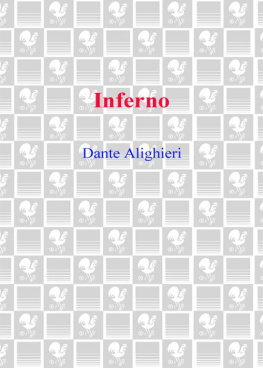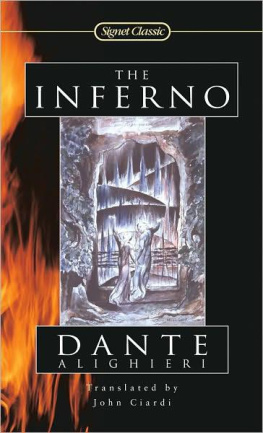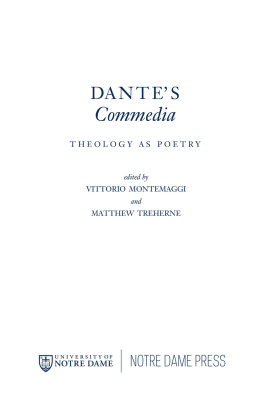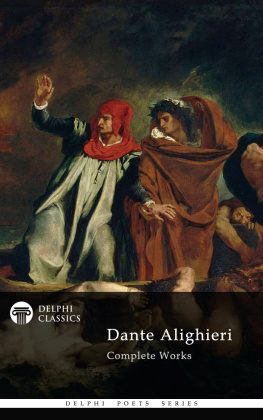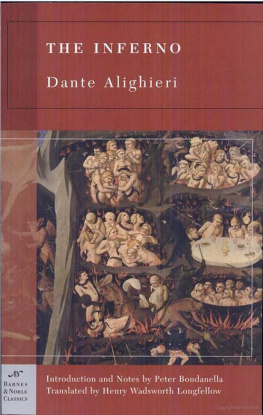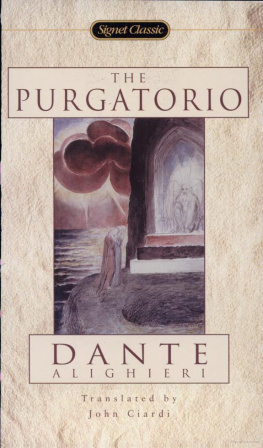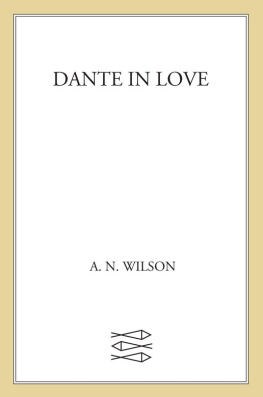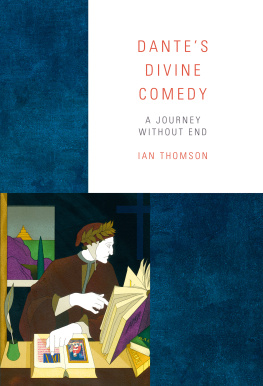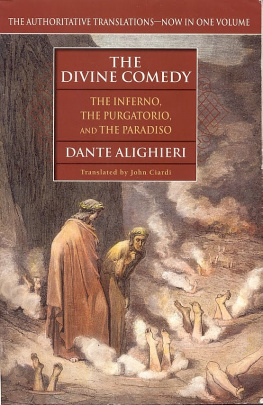Dante Alighieri - Dantes The Divine Comedy - The Inferno
Here you can read online Dante Alighieri - Dantes The Divine Comedy - The Inferno full text of the book (entire story) in english for free. Download pdf and epub, get meaning, cover and reviews about this ebook. year: 2012, publisher: Knopf Doubleday Publishing Group, genre: Religion. Description of the work, (preface) as well as reviews are available. Best literature library LitArk.com created for fans of good reading and offers a wide selection of genres:
Romance novel
Science fiction
Adventure
Detective
Science
History
Home and family
Prose
Art
Politics
Computer
Non-fiction
Religion
Business
Children
Humor
Choose a favorite category and find really read worthwhile books. Enjoy immersion in the world of imagination, feel the emotions of the characters or learn something new for yourself, make an fascinating discovery.

- Book:Dantes The Divine Comedy - The Inferno
- Author:
- Publisher:Knopf Doubleday Publishing Group
- Genre:
- Year:2012
- Rating:4 / 5
- Favourites:Add to favourites
- Your mark:
- 80
- 1
- 2
- 3
- 4
- 5
Dantes The Divine Comedy - The Inferno: summary, description and annotation
We offer to read an annotation, description, summary or preface (depends on what the author of the book "Dantes The Divine Comedy - The Inferno" wrote himself). If you haven't found the necessary information about the book — write in the comments, we will try to find it.
Dantes The Divine Comedy - The Inferno — read online for free the complete book (whole text) full work
Below is the text of the book, divided by pages. System saving the place of the last page read, allows you to conveniently read the book "Dantes The Divine Comedy - The Inferno" online for free, without having to search again every time where you left off. Put a bookmark, and you can go to the page where you finished reading at any time.
Font size:
Interval:
Bookmark:

Dante Aligheri, 12651321
[Inferno. cm.
ISBN 0-385-49697-4
Includes bibliographical references and index.
I. cm.
ISBN 0-385-49697-4
Includes bibliographical references and index.
I.
Hollander, Robert. II. Hollander, Jean. III. Title.
PQ4315.2 .H65 2000
851.1dc21 00-034531 eISBN: 978-0-345-80310-8 Author photograph of Robert Hollander by Pryde Brown
Cover painting: Hell and Fall of the Damned by Hieronymus Bosch
Scala/Art Resource, NY
Cover design by Mark Melnick
Book design by Pei Loi Koay
Map design by Jeffrey L. Ward www.anchorbooks.com v3.1 for
Francesco,
Maria Grazia,
Stefano,
Simonetta,
Enrico,
& Tommaso
The first type is embedded in the line numbers to the left of the text: these links allow you to click back and forth between the English translation and the original Italian text while still holding your place. The second type of link, which is indicated by an arrow () at the end of a line of poetry, will bring you to an explanatory note. You can click on an arrow to navigate to the appropriate note; you can then use the links at the end of each note to return to your location in either the English translation or the original Italian text. You can also click on the note number to return to your location in the English translation.
Reader, this is an honest book. Montaigne says this of his Essays.
We would like to say the same of this translation. We have tried to bring Dante into our English without being led into the temptation of making the translation sound better than the original allows. The result may be judged by all who know him in his own idiom. This is not Dante, but an approximation of what he might authorize had he been looking over our shoulders, listening to our at times ferocious arguments. We could go on improving this effort as long as we live. We hope that as much as we have accomplished will find an understanding ear and heart among those who know the real thing.
Every translation begins and ends in failure. To the degree that we have been able to preserve some of the beauty and power of the original, we have failed the less. The accuracy of the translation from the Italian text established by Giorgio Petrocchi (196667) has been primarily my responsibility, its sound as English verse primarily that of the poet Jean Hollander, my wife and collaborator. As will be clear from various notes in the text, I am not always in accord with Petrocchis readings; however, I thought it imperative to use as the base of this entire project the current standard Italian text of the work, indicating my occasional desire to diverge from it only in its margins. My original intention was to reproduce the John D. Sinclair translation (1939) of Inferno, cleaning up its just barely post-Victorian thees and thous and other such, to a twenty-first-century ear, outdated usages.
However, (a) differences between the Italian in the Societ Dantesca Italiana (1921) edition, from which Sinclair translated, and Petrocchis edition, (b) later corrections of Sinclairs version by a later translator, Charles Singleton, (c) further study of Dantes lines themselves, (d) a sense of ways in which a prose translation eventually fails to be sayableall of these considerations led us to attempt a new verse translation of the first cantica, despite our original debt to Sinclair. Those who come to our text familiar with the Singleton translation (1970) will perhaps think that it is its resonance that they occasionally hear; this is because a tremendous amount of Singletons translation conforms word-for-word to Sinclairs, as anyone may see simply by opening the two volumes side by side. Thus, having decided to begin with Sinclair and to modify him, we found that Singleton had apparently done essentially the same thing. To his credit, his changes are usually for the better; to his blame is his failure to acknowledge the frequency of his exact coincidence with Sinclair. And thus, on his own advice, we have considered it a mistake not to let the efforts of ones predecessors contribute to ones own (page 372), and have on occasion included his divergences from Sinclair when we found them just. However, let there be no mistake: the reason our translation seems to reflect Singletons, to the extent that it does, is that ours, on occasion, and Singletons, almost always, are both deeply indebted to Sinclair.
In February 1997, when my wife and I decided to commit ourselves to this effort, we were able to consult the draft of a verse translation of Inferno composed by Patrick Creagh and me (begun in 1984 and abandoned in 1988, with some 80 percent of the work Englished). Some of its phrases have found their way to our text, and we owe a considerable debt to Patrick Creagh (and to my earlier self), which we are glad to acknowledge. We also owe a debt to the prose paraphrases of difficult Italian passages found in the still helpful English commentary by the Rev. Dr. H. F.
Tozer (1901); and to glosses gleaned from various Italian commentaries (most particularly, in the early cantos, those of Francesco Mazzoni [196585], but also to the interpretive paraphrases found in the Bosco/Reggio commentary [1979]). We decided early on that we would not consult contemporary verse translations until after we had finished our work, so as to keep other voices out of our ears. Several friends and colleagues have helped us in our task. Lauren Scancarelli Seem, administrative coordinator of the Princeton Dante Project, was our first reader, making a number of suggestions for changes. Margherita Frankel, a veteran Dantist as well as a good friend, gave us a close reading and made many valuable criticisms to which we have attended. The poet Frederick Tibbetts lent us his exacting ear and made dozens of helpful suggestions.
Lino Pertile, the Dante scholar at Harvard University, also combed through our text and made a number of helpful suggestions. The paperback edition benefitted from the eagle eye of Peter DEpiro, who caught a number of slips that have been corrected in this printing. Our greatest debt is to Robert Fagles, who went through this translation verse by verse and made many hundreds of comments in our margins. To have had such attentive advice from the most favored translator of Homer of our day has been our extraordinary fortune and pleasure. Our goal has been to offer a clear translation, even of unclear passages. We have also tried to be as compact as possiblenot an easy task, either.
It is our hope that the reader will find this translation a helpful bridge to the untranslatable magnificence of Dantes poem. February 1997 (Florence)February 1998 (Tortola) For this reprinting of the Anchor Books edition, we have made about one hundred and fifty changes in the translation, mainly affecting phrasing and punctuation. There are also some five or six changes in the notes.
Font size:
Interval:
Bookmark:
Similar books «Dantes The Divine Comedy - The Inferno»
Look at similar books to Dantes The Divine Comedy - The Inferno. We have selected literature similar in name and meaning in the hope of providing readers with more options to find new, interesting, not yet read works.
Discussion, reviews of the book Dantes The Divine Comedy - The Inferno and just readers' own opinions. Leave your comments, write what you think about the work, its meaning or the main characters. Specify what exactly you liked and what you didn't like, and why you think so.

